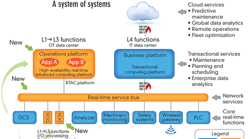To spark more innovation, openness and security in distributed control systems (DCSs), ExxonMobil Research and Engineering Co. (EMRE) has awarded Lockheed Martin a contract to serve as the systems integrator in early-stage development of a next-generation, open and secure automation system for process industries. The contract was announced on Jan. 14 and at the ARC Industry Forum on Feb. 9 in Orlando, Fla.
"It's too difficult to replace a DCS, and we're not getting enough value from them," said Don Bartusiak, chief process control engineer at EMRE, during his keynote address at the ARC event, adding that ExxonMobil faces global growth and competition, but must lower capital costs and improve profitability. "We have opportunities with finite windows."
Working with EMRE in a pre-development phase, Lockheed Martin will handle the project's advanced processing architecture. As part of this research phase, Lockheed Martin held an "Industry Day" on Jan. 26 to begin soliciting requests for information (RFIs) from industry to support of the new system.
"We continue to challenge ourselves by looking at existing processes, and finding new and more innovative ways of working using both internal and external ideas," says Vijay Swarup, R&D vice president at EMRE. "This breakthrough initiative could help transform refining and chemical manufacturing through the use of high-speed computational components, modular software, open standards, and the use of autonomous tools."
ExxonMobil reports its goal in working with Lockheed Martin is to design a new process automation architecture that will control and optimize refining and chemical manufacturing facilities, while enabling future equipment and information services such as preventive maintenance and fleet optimization. It adds the new control system's design and implementation will be based on architectural standards that will ensure modularity, interoperability, extensibility, reuse, portability, and scalability of the new system.
"Lockheed Martin is a leader in providing open architecture and secure processing solutions for our customers," adds Paula Hartley, vice president of advanced product solutions for Lockheed Martin's Mission Systems and Training division. "The advantages of our secure commercial processing experience combined with the expertise in applying open architecture standards provides a low-risk solution for ExxonMobil's process control requirements."
ExxonMobil envisions a new "system of systems" that will allow it to more easily adapt its operations environment to change needs and opportunities.
Graphic by ExxonMobil.
ExxonMobil and Lockheed Martin report the new automation platform will give manufacturers several key benefits, such as intrinsic cybersecurity protection adaptable to emerging threats. One step toward this goal has been Lockheed Martin's participation in the Open Group's Future Airborne Capability Environment (FACE) Consortium, which is a gathering of avionics manufacturers formed in 2010 to create an open avionics standard for making military computing operations more robust, interoperable, portable and secure.
ExxonMobil plans to prototype the new architecture in 2016, and deploy it in 2019 as a standards-based, open, secure and interoperable control platform. ExxonMobil and Lockheed Martin add the new architecture will also promote competition and innovation in the marketplace, and its interoperability, modularity and adherence to industry standards will lower the cost of integrating new system components or replacing legacy platforms. Bartusiak adds it will usable in brownfield and greenfield facilities, and marketable—not exclusively to ExxonMobil—but available to all current DCS markets.




